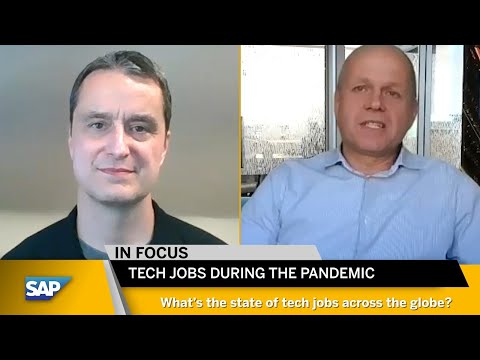Tech companies have been great places to work during the pandemic, offering sweet benefits such as telecommuting and flexible hours — and a steady paycheck. But it is only a good gig if you can get it.
Being a competitive job candidate has been especially tricky in some regions, such as South Korea, where a massive long-term stimulus package is underway.

“The Korean New Deal — parallel to the United States’ Great Depression-era program in the 1930s … calls for a ₩160 trillion ($133 million) investment by 2025 and creation of 550,000 new jobs,” The Korea Herald recently stated. “The Digital New Deal… centers on developing technologies that have been tied to the fourth industrial revolution, including 5G, artificial intelligence [and] ‘untact’ technology, which promotes a contact-free society.”
Such stimulus packages — and the COVID-19 crisis itself — underscore the need to hire skilled people who can implement and run an intelligent enterprise, according to Rudolf Held, global head of SAP Co-Innovation Lab locations. This is true around the world, but SAP’s efforts to help began with underemployed university graduates in South Korea.
See the Picture
“We wanted to help them find jobs,” Held said. “Therefore, we teamed up with the SAP Korea Training and Adoption team and the Korean government. We collaborated with an institute under the Ministry of Science and ICT to design and run a program that would equip these young people with the right skills that are needed in the market.”
According to Held, those marketable skills span the entire innovation process from start to finish across an ecosystem — different companies, schools, and other organizations. Building on lessons learned from previous programs, SAP Co-Innovation Lab expands students’ comfort zones beyond technology and their university coursework.
“SAP Co-innovation Lab is actually all about collaborative innovation with the SAP ecosystem of customers, partners, startups, and academia, providing them with this broader view, a broader skillset,” Held said.
These broadened horizons have been vital, according to a recent university graduate and program alumnus.
Standing Out from the Crowd
“I had less experience than others, so it was very difficult to prepare for employment in Korea,” said Young Wan Roh, who completed his SAP Co-Innovation Lab and Training and Adoption project last November via SAP technology consultancy CY Global. “I think the three-month project experience has helped a lot.”
It helped so much that he became a much more attractive job candidate in a very competitive job market, according to Roh, who graduated from Konyang University in February. In addition to ecosystem-wide innovation, he learned valuable lessons about working with other students from different disciplines — and how to manage them.
“My major is computer engineering, so I led the team and I taught my teammates,” said Roh, who now works as an ABAP developer at Seoul-based IT service provider NDS Corp. “It was very challenging for me.”
That is due in part to the breadth of training at SAP Co-Innovation Lab, which requires students to collaborate with people from business, design, and other teams, whom they probably would not otherwise have met.
Finding the Business Value of New Tech
“Students are usually very good with new technologies — probably better than people who have been in the industry for a couple of years — because they adopt everything that is new,” said Held, who has been working with university students for more than 12 years. “But you have to make it relevant for the industries; you have to make it relevant for businesses.”
Indeed, learning to find the business value of cutting-edge technology can be a big challenge for the students, according to Held. SAP Co-Innovation Lab helps them over that often-steep learning curve.
“We try to help the students to at least keep [the business outcome] in the back of their minds,” Held said. “They should always think in a more realistic way of, ‘How does it help a company?’”
The country’s young tech workers will clearly have plenty of new tech to choose from.
“South Korea has been integrating [blockchain] technology in public services for years,” CoinGeek stated in July. “Other technologies that the government intends to invest in heavily include the Internet of Things, cloud computing, Big Data, machine learning, and robotics.”
Putting It All Together
“We really wanted to make sure that the participants of the training learn about project management,” Held said. “They think end-to-end, from the ideation to an economically viable solution that delivers value to customers.”
SAP Co-Innovation Lab cultivates a mindset — in addition to teaching programming techniques, business processes, and more. It helps students understand the whole process of innovation, and to see it in the full context of their organization.
“That was one of the key differentiators of that program,” Held said. “And that helped people like Young Wan to find jobs afterwards.”
Listen to more episodes of In Focus.
Follow Derek on Twitter: @DKlobucher



